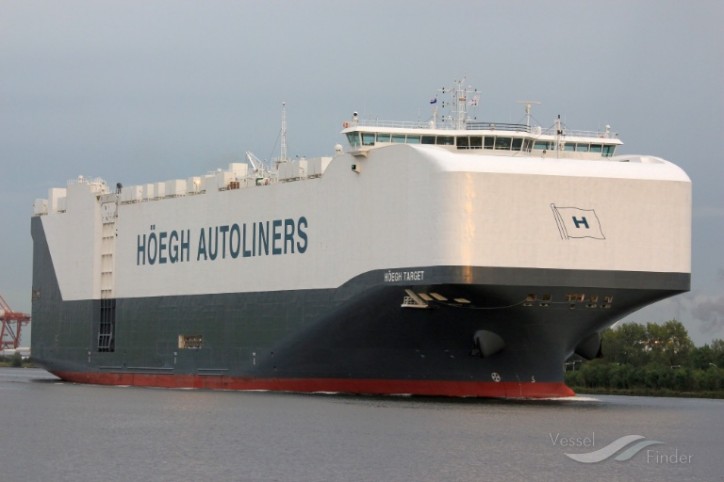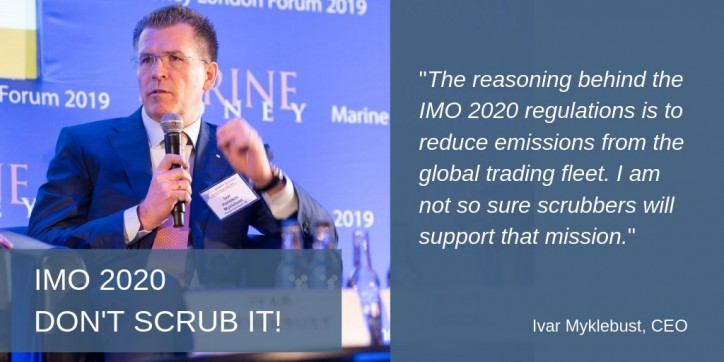Höegh Autoliners stands firm on its decision not to implement scrubbers but comply with the IMO 2020 regulations by using Very Low Sulphur Fuel Oil or Low Sulphur Marine Gas Oil. In this interview; CEO, Ivar Myklebust gives more background to the decision.

“We have ordered zero scrubbers and will order no more”, says Ivar Myklebust, CEO of Höegh Autoliners. ”There are many reasons to why we have decided against scrubbers”.
Moving the problem from air to sea
“First of all, the reasoning behind the IMO 2020 regulation is to reduce emissions from the global trading fleet. I am not so sure scrubbers will support that mission”, Ivar says.
A scrubber works as a cleaning entity on board; it cleans the exhaust from particulates before the exhaust is emitted to the air. However, the residual does not go away, and the scrubber systems wash this in to the sea.
“Surely, scrubbers will reduce emissions to air, but it appears as it will just move the emissions to the sea instead.” Ivar says.

Scrubbers increase fuel usage
He continues: “Implementing a scrubber can actually end up increasing the Co2 footprint of a vessel. The scrubber adds weight to the vessel and requires tens of thousands of tons of water to wash through the systems each day. This requires energy and energy comes from burning more fuel, in this case High Sulphur Fuel.”
Port areas are banning scrubbers
Another reason for deciding against scrubbers is that ports have already started to ban open loop scrubber. Shanghai wider port area and Singapore are two ports that have implemented the ban and it is quite likely that Sulfur Emission Control Areas (SECAs) will follow. The Port of Fujairah is furthermore forbidding the discharge of wastewater with sulphur.
“If this is a trend it is impossible to say, but it looks like more ports will follow”, Ivar says. “Considering that each of Höegh Autoliners’ vessels, spend 60-70 days in ports annually, often in areas where scrubbers are banned, it makes little sense for us to invest in scrubbers.“
Vessel design
“Structurally, Pure Car and Truck Carriers are also not ideal for scrubbers. Fourteen decks high, it is challenging to put in a scrubber that should go from the engine room up through the whole vessel to the chimney.” Ivar says.
In-efficient industry model
Then there is the point of doing what you do best. Refineries are set to refine oil at large scale and do it efficiently. All logic says that having 70 000 mini-refineries sailing around the globe is not the most efficient way of dealing with the new give.
“Why focus on using a product that will be banned?” Ivar questions, aiming at the High Sulphur Fuel that the scrubber advocates will continue using. “I want to hear from the refineries how they will secure us with sufficient supply of a product that is legal, namely the Very Low Sulphur Fuel Oil and Low Sulphur Marine Gas Oil.”
Bunker Adjustment Factor
No matter how you do it, transporting cargo by sea will be more expensive from 1 January 2020. Those that invest in scrubbers will need their investments to be paid off and for those using Very Low Sulphur Fuel Oil or Low Sulphur Marine Gas Oil, the fuel will be considerably more expensive.
“With shipping rates already down at unsustainable levels in the RoRo industry, this is not a cost that can be carried by the shipping lines.” Ivar says. “In our industry, the standard is to share the risk and return of bunker price shifts with the customers, through a Bunker Adjustment Factor in the contracts. Focus is now on assuring that all our contracts reflect the new standard bunker point, as we approach end of 2019.”
Source: Höegh Autoliners